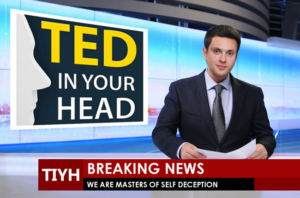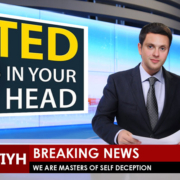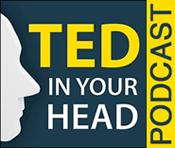We are Masters of Self Deception – Episode 451
 We are Masters of Self Deception – Episode 451
We are Masters of Self Deception – Episode 451
“To thine own self be true.” We’ve probably heard these words from Shakespeare before. Yet, all of us lie to ourselves, avoid reality, rationalize, make excuses and blame others because we are unable or unwilling to see what is right in front of us. We are masters of self-deception and the consequences of our deception can range from simply kidding ourselves about small matters, all the way to up to feeling exhausted and anxious from the energy it takes to lie to ourselves and others. In this episode, Ted examines how and why we deceive ourselves and how difficult it is to know that we are. Chances are you are BS-ing yourself about something, so take some time to check out this episode.
Listen to this podcast episode now:
Sometime in the 90’s while I was living in Tucson, AZ, I decided to become an independent life insurance agent. Someone had shown me an opportunity to make money and get residuals and all that good stuff, and since I had no clue what to do with my life at that point, I signed up.
I went through the training and started going to the sales meetings. Though in my opinion, the guy that had signed me up with this company was a bit of a knucklehead, he seemed to be making money. So I actually took the insurance test and got my license.
This was an in- home deal where you go to people’s houses and check out their insurance policies and try to sell them a new policy. However, even months after I got my license, I had yet to make an appointment to see someone to sell insurance. I just never got around to actually calling someone and going to their house.
I would go to the team meetings and the other agents would ask me “So, Ted, when are you going to get your first deal?” “Soon” I assured them. I told the team leaders not to give up on me, but I never made a single appointment to see someone to try to sell them life insurance. I started to feel like a real loser.
One day, I said to myself “Self, this is not going to happen. The truth is I have no intention of ever selling life insurance.” I said adios after wasting a lot of time beating myself up. I was fooling myself and I had to stop my self-deception.
Richard Feynman, the American physicist said: “The first principle is that you must not fool yourself — and you are the easiest person to fool.”
Have you ever
· Been in a relationship that you knew would not last but tried to convince yourself it would?
· Been in a job you knew was not right for you but kept hoping it would get better even though you knew it wouldn’t?
· Kept putting off taking action while hoping a situation would resolve itself until it got so messy you that you were forced to do something?
If so, you know what self-deception feels like. We all deceive ourselves if we’re honest. But that’s the problem isn’t it? We are not always honest with ourselves. We’ll do it consciously or subconsciously; it can be a consistent pattern of behavior or what we do when our back is against the wall.
Self-deception can be helpful; we can use self-deception to protect ourselves, or to enhance our belief that we can accomplish something.
However, self-deception can be the root of self-sabotage and a way to avoid responsibility for our lives and what happens in them. Why are we such masters of self-deception? Why is it so easy to fool ourselves? It’s because we have a tendency to believe what we think. We believe what we tell ourselves. But there is often a vast difference between what we think and what we know to be true.
Deep down inside, I knew I was kidding myself about being an insurance agent. If I had stopped and asked myself “What am I doing?”, I would have been able to see my self-deception: that I was just going through the motions with no intention to see it through. I could’ve saved myself a lot of time and money if I had done that earlier. Why didn’t I?
I didn’t want to disappoint the organization that I was working with. I wanted to believe that I could do something and be good at it. I wanted to be somebody.
However, the area of my life where self-deception was rampant was in my romantic relationships. Ove and over, I knew I was wasting my time with a particular partner, or I knew they were wasting there time with me. Yet, I convinced myself that there was a future for us, so I pretended that there was, yet I knew it wasn’t going to last. But I wanted it to last. I needed it to last.
So how do we figure out that we are involved in self-deception?
We don’t figure it out. Because it’s your mind that wants to deceive you in the first place. Bob Dylan said “You cannot depend on it to be your guide, when it’s you that must keep it satisfied.” We can’t count on the thing that’s deceiving us to reveal our own self-deception. It’s like seeing your own eye. We are often unaware that we are deceiving ourselves.
We’ll use logic to justify our actions despite what we feel. This way we can ignore the voice inside that is asking us “What the hell are you doing?”
We will rationalize, make excuses, blame others or get angry or defensive with others when they call us out. According to Wikipedia, self-deception is
“ A process of denying or rationalizing away the relevance, significance, or importance of opposing evidence and logical argument.”
We can identify self-deception by the way it makes us feel. If we give ourselves the opportunity, we will feel our own self-deception. Chances are that others around us are feeling it as well.
Feelings come and go. But when they come and refuse to leave, then it’s time to pay attention.
Here is a good rule of thumb: if you are caught up in self-deception, you will experience struggle and conflict. You might be getting sick a lot, feeling tired and ill at ease. The bigger the self-deception, the bigger the lie you are telling yourself, the crappier you will feel. Anxiety, discomfort, and guilt, can result from being inauthentic with ourselves, and don’t underestimate the negative impact our inauthenticity will have on our lives and our health.
Self-deception can leave us feeling exhausted, overwhelmed and numb. As we get better at lying to ourselves, we get better at lying to others. Our relationships can suffer, our job performance declines, we can lose clarity and eventually lose touch with ourselves and with what is important, meaningful and valuable. Imposter syndrome is a consequence of self-deception. To attempt to avoid these feelings we might turn to numbing or medicating behaviors such as drugs and alcohol.
If you are true to yourself, stuff just seems to flow. There may be challenges, but we can meet them with grace and ease.
Are you getting the feeling that self-deception has you blind, fumbling and stuck? Here’s how you can shed light on that dark corner.
· Ask someone. This takes a rare kind of courage. You walk up to someone that knows you well and you ask them “I get the feeling that I’m fooling myself about this situation. What do you think?” If there is self-deception that has been festering and is getting stinky to others around you, they won’t hesitate to gleefully point it out to you and possibly smack you side of the head.
· Write in a journal. Sit down with a pen and paper and ask: “Please tell me what I need to know.” Then just start writing. Anything. Sometimes what shows up is kind of like a smack on the side of the head. Use this as a tool of self-reflection and to build self-awareness.
· Ask your subconscious mind before you go to sleep. Just ask a question like “Give me clarity to see what is true” or “Allow me to know if there is self-deception here.” Sometimes you’ll get a dream, sometimes you’ll know upon waking, sometimes it will come to you out of nowhere like a smack in the head.
· Go take a walk. Again, ask for clarity with a sense of calm relaxation. Go walking or riding a bike without trying to think or figure things out. I did this once while thinking about a business associate who I was trying to convince myself I could trust. Suddenly, bits and pieces of information came together for me that made it
clear to me that I could not. I was so astounded that I had not seen this before that I walked into a street sign. It was very much like a smack in the head.
· Work on your own self-confidence, self esteem and self-acceptance. Cultivate the courage to be honest with yourself and to see things you would rather not see or think about.
· Look at those areas of your life that are ruled by fear. Look at when you want to blame. Be very aware of when you avoid what you know you need to address.
· Go see a professional like myself to help you figure it you. I promise I will not smack you in the head.
It doesn’t take much to see the truth. The first step is to acknowledge that we all lie to ourselves and that we are really good at it.
Here are a couple of really good quotes:
“We do not deal much in fact when we are contemplating ourselves.”
-Mark Twain
“If you want to be successful, you must respect one rule: Never lie to yourself!”
–Paolo Coelho, Brazilian novelist
Want to catch up on previous episodes? Click Here >
Thanks for reading this and remember, if you have the uncomfortable feeling that you are caught up in a web of your own self-deception or other people are telling that you are, contact me for a complimentary consultation to see if hypnotherapy and high-performance coaching can help you be clear, honest and authentic about what really matters in your life. You can do that by going to TedMoreno.com/contact.
Be real,
Ted




